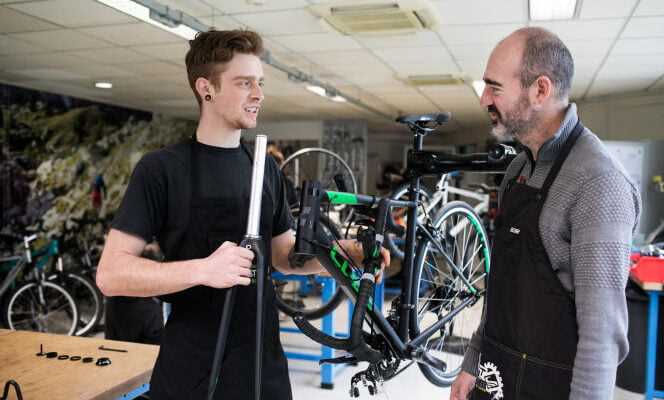This is called an atypical profile. Heavyweight instructor in a driving school, Nicolas Hémard, 33, is also training in the basics of bicycle repair. “We tend to oppose motorists to cyclists, as if we had to choose sides”, he regrets. This winter, Nicolas Hémard is enrolled in the “cycle operator” training course approved by the Academy of Cycling Trades. A course offered at twelve sites in France, which he follows at the CNPC, a sports business school which has a campus in St Denis (Seine-Saint-Denis), one of the institutions able to issue this diploma.
This new twenty-day program, launched with the support of the French Federation of Bicycle Users (FUB), aims to meet a growing demand for repairs. The objective is to train 1,250 people by 2023. And there is no shortage of candidates: as soon as online registration opened, each CNPC campus recorded a demand four times greater than the reception capacity – i.e. an average of 50 applications for 12 places available per session.
The training costs 2,633 euros, and its financing is decreasing: people registered for the first wave of training, between November 2020 and October 2021, benefited from 100% support. The successive waves, which go until June 2023, will be covered up to 75%, then 40%, and finally 15%.
In the room, the whiteboard is next to drawers filled with pliers, keys, cranks and tire levers. Cycles are hung on wall brackets. “We call them martyr bikes: they have been broken down and repaired dozens of times,” specifies François Weiser, the trainer, professor of history and geography on availability from the national education system.
No bike crossing the threshold of the school leaves without having made a beauty. That of the journalist is no exception, and finds itself suspended from a large workshop stand. “We always start with the front wheel, we check the tightness, the condition of the hub, the tire pressure, the spokes. Ah, the braking is not symmetrical, there will be an adjustment on the front brake”, charges the trainer. His hands, already blackened by grease, run through the little queen and stop on the headset: “He meets every five years. This one hasn’t seen grease in a good decade. »
Questions abound among the twelve students: what if the customer prefers to buy a new bike that will cost her as much as the intervention? “It’s not ecological, even less economical: the bicycle is not a disposable object. Well maintained, it has a lifespan of seventy years”, emphasizes François Weiser. “No one is here out of opportunism, they are passionate people”, he assures.
You have 55.63% of this article left to read. The following is for subscribers only.
